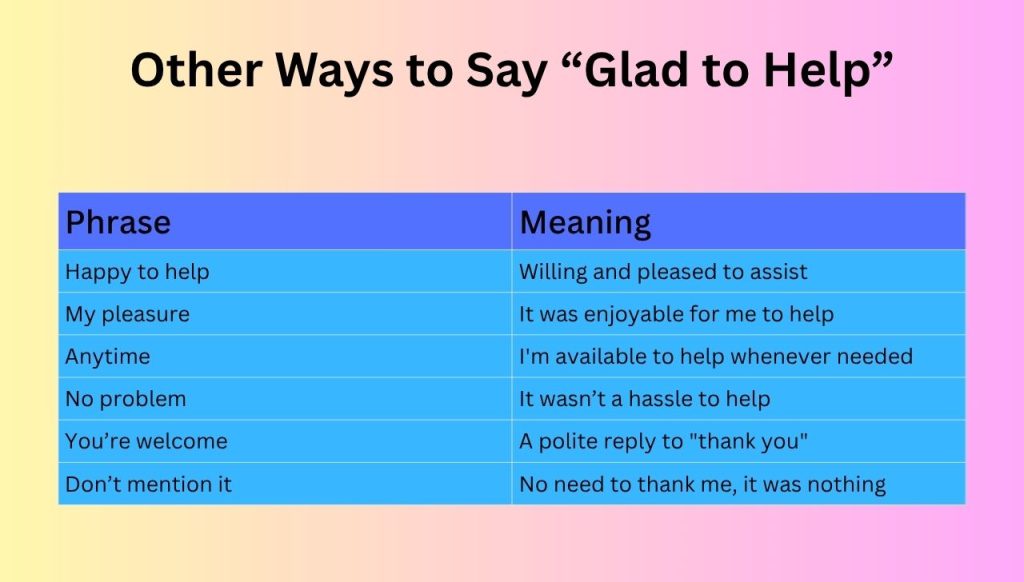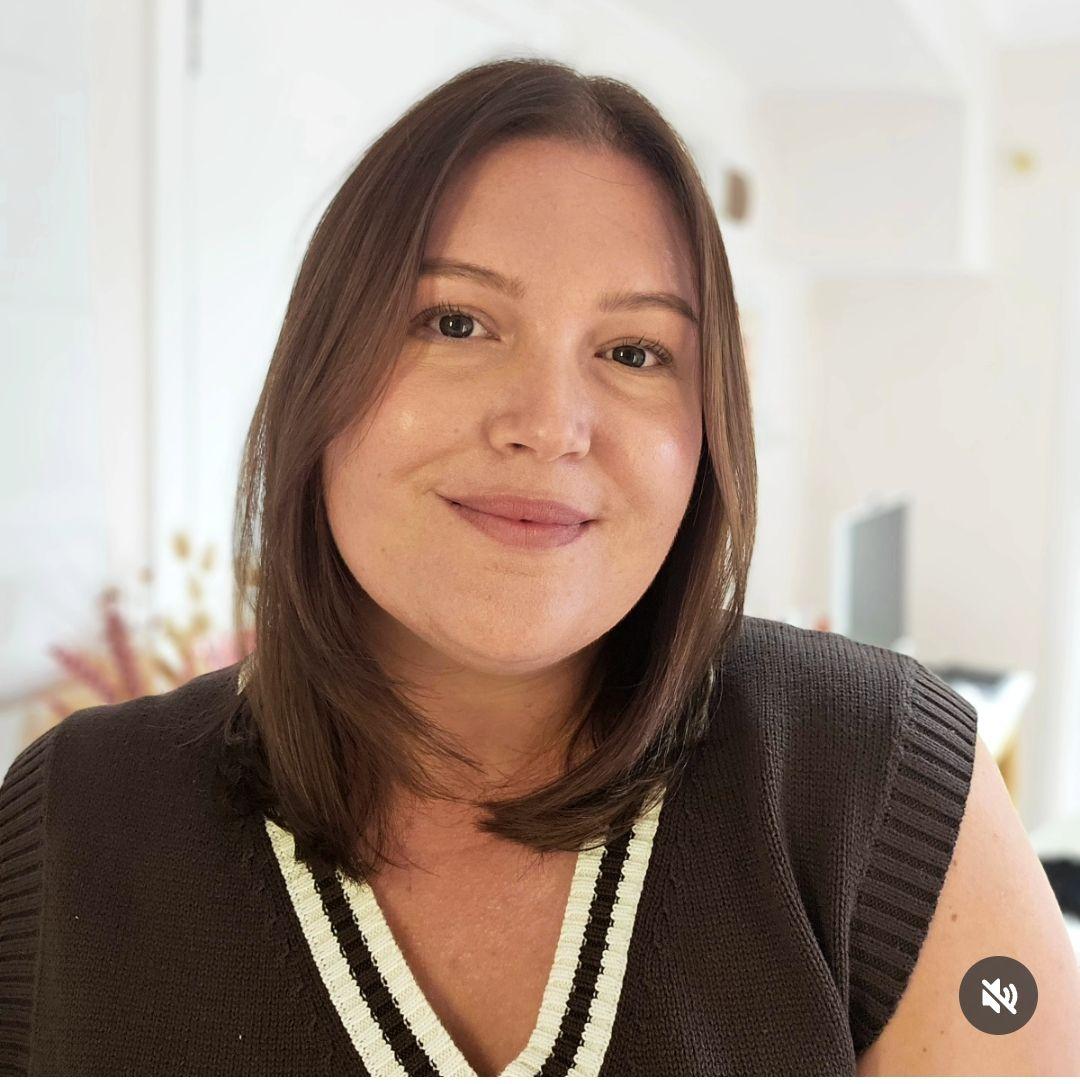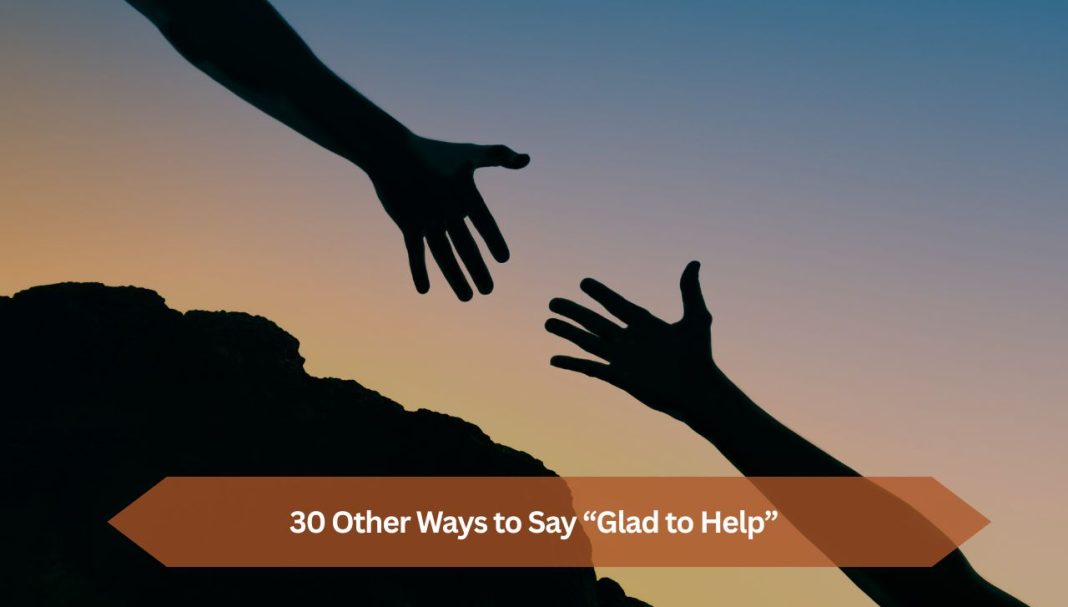Ever find yourself replying, “Glad to help” for the fifth time in an email thread and wondering if there’s a better way to say it? Yeah, it happens to the best of us. While “glad to help” is polite and friendly, it can start to feel stale when you use it repeatedly. The good news? Plenty of alternative phrases convey the same sentiment without sounding like a broken record.
“Glad to Help” Meaning
“Glad to help” is one of those go-to phrases we toss around in work emails, casual chats, and even customer service replies. At its core, it means you’re happy to assist someone. It carries a sense of willingness, approachability, and kindness. It tells the other person: “I’m here for you, no trouble at all.”
That being said, context matters. The tone can shift, whether you’re texting a coworker, writing a customer response, or casually chatting with a friend. Sometimes you want to sound more formal; other times, a laid-back or warm tone fits better.
Discover More : 30 Other Ways to Say “Please Be Advised” (With Meaning, When & Why to Use It)
When to Use “Glad to Help”
The beauty of this phrase lies in its versatility. It’s a solid choice in most situations, like:
- Responding to a thank-you email from a colleague.
- Assuring a customer after solving a problem.
- Letting a friend know you didn’t mind doing a favor.
But it can feel robotic if you’re using it in every exchange. Plus, depending on the audience, you might want to dial the tone up or down a notch. For example, a quick “Anytime!” might suit an internal Slack chat, while “Always a pleasure to assist” might be better for a client.
Why Say “Glad to Help”
On the surface, it’s just good manners. But beneath that, it strengthens relationships—professional or personal. Offering help (and being genuinely happy to do so) builds trust, opens doors, and leaves people with a positive impression of you.
The trick is to keep it fresh. That means occasionally switching up your phrasing so your kindness doesn’t feel automated. Variety keeps your tone authentic, especially in customer service or high-volume communication roles.

Other Ways to Say “Glad to Help”
| Phrase | Meaning |
|---|---|
| Happy to help | Willing and pleased to assist |
| My pleasure | It was enjoyable for me to help |
| Anytime | I’m available to help whenever needed |
| No problem | It wasn’t a hassle to help |
| You’re welcome | A polite reply to “thank you” |
| Don’t mention it | No need to thank me, it was nothing |
| It’s nothing | It didn’t require much effort |
| Of course | Naturally, I was willing to help |
| Sure thing | Definitely, no trouble at all |
| No worries | There’s no need to be concerned about asking |
| Always happy to help | I consistently enjoy offering help |
| Absolutely | Completely willing |
| Not a problem | Helping caused no issues |
| Glad I could help | I’m pleased I was able to assist |
| Any time you need | I’m here whenever you require help |
| Consider it done | I’ve taken care of it willingly |
| That’s what I’m here for | Helping is part of my role |
| I’ve got you covered | I’ll take care of it for you |
| At your service | Ready and willing to assist |
| It’s all good | Everything’s fine, no trouble helping |
| Just doing my part | I’m fulfilling my responsibility |
| I’m here to help | I’m available to assist |
| No big deal | Helping wasn’t difficult |
| Don’t worry about it | There’s no need for gratitude |
| All in a day’s work | It’s part of what I regularly do |
| More than happy to help | Very pleased to assist |
| It was the least I could do | I did a small part, happy to help |
| I’m always here for you | You can count on me for support |
| Anything for you | I’m willing to do whatever you need |
| Count on me | You can rely on my support |
Discover More : 30 Other Ways to Say “Enjoy Your Weekend” (And When to Use Them)
Conclusion
The phrase “Glad to help” does a lot of heavy lifting in our day-to-day conversations. It’s friendly, flexible, and easy to use. But when communicating with different people across various platforms, shaking things up with an alternative phrase can make your message feel more personal, thoughtful, and… human.
So the next time someone thanks you for your help, skip the auto-reply and pick a phrase that fits the moment. Whether it’s “My pleasure” or a simple “You got it!”, you’ll sound more natural—and that never goes out of style.

Grammar Nerd, ESL Trainer, Low-Key Comma Crusader
Daniel has taught English for over a decade, from small community classes in Oaxaca to bustling university halls in London. He has a knack for turning even the driest grammar points into relatable, real-life language tools—think fewer red pens, more real talk. He co-founded Grammation to make grammar less gatekeeper-y and more global. When he’s not decoding sentence structures, he’s probably hiking with a paperback novel or adding unnecessary hyphens for fun.
“The rules of grammar should empower people—not trip them up.”


